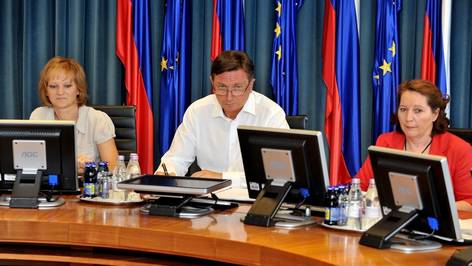NEWS
Prime Minister's press conference held after the Government's 144th regular session
After today's 144th regular session of the Government, Prime Minister Pahor expressed his belief that the president of the Council of Europe, Herman van Rompuy, would call an extraordinary summit of eurozone heads of state, despite the official invitation not having yet been sent. At the same time, he postulated that certain important decisions would be adopted at the summit, which would bring about new circumstances. 'If this is really the case and it will bring about the need for additional fiscal measures, the Government has one week left for potential additional measures.
Since the Government has not been acquainted with the draft decisions of the eurogroup summit, Prime Minister Pahor announced that he would need to acquire the Government's mandate for the aforementioned heads of state meeting at a correspondence or extraordinary session of the Government. Prime Minister Pahor also announced that he would stay in contact with the National Assembly and propose an extraordinary session of the Parliamentary Committee in the event that this is required by the proposals for the extraordinary eurogroup summit of the. The Prime Minister repeated his warning that the world faces a new recession, this time also owing to problems in the eurozone. While insecurity in the financial markets increases and advances, Slovenia must respond accordingly; it has done what it could through the draft supplementary budget. Prime Minister Pahor also took the view that Slovenia should not be punished despite the great sensitivity of financial markets and credit rating agencies, as its public finance situation is relatively stable. 'As psychology plays an important role in the markets, we need to be very careful, especially in communicating measures,' the Prime Minister of Slovenia averred.
With regard to the new capital increase for Nova Ljubljanska banka or, if necessary, Nova Kreditna banka Maribor, Prime Minister Pahor said that this should not be carried out with the taxpayers' money. 'In this case, one or the other bank should strive to find an appropriate partner or financial investor,' added the Prime Minister. He stressed that such a decision would be decisive. 'It is not about selling off the State's treasures but to preserve them,' asserted Prime Minister Pahor.
At today's session, the Government adopted the draft supplementary budget for 2011. The Government is aware of the importance of the stability of the whole of Europe's fiscal policy, which is also a guarantee for Slovenia's fiscal stability. The draft supplementary budget ensures the stability of the public finances and appropriate resources and legal bases enabling the active participation of Slovenia in ensuring the protection of financial stability in the eurozone. In order to achieve these objectives, the level of general government expenditure is adapted so as to maintain the national budget deficit as a share of gross domestic product at almost the same level; in addition, Slovenia still participated in the activities taking place within the European Union or the eurozone with the aim of providing assistance to Greece and thus the protection of financial stability in the eurozone. With the proposed supplementary budget measures for 2011, the national budget deficit will remain nominally the same as it was in the adopted budget for 2011, i.e. slightly lower than EUR 1.7 billion. The aforementioned measures also follow the objectives set in the Stability Programme. The envisaged supplementary budget pursues the objective of investing further in development turnaround, i.e. the promotion of the economy of knowledge. The supplementary budget will also aim at ensuring social security under the present adverse labour market conditions. The proposed draft breakdown, which is the basis for the preparation of the national budget for 2011, therefore does not yet envisage any additional measures in the field of salaries, pensions or social transfers.




